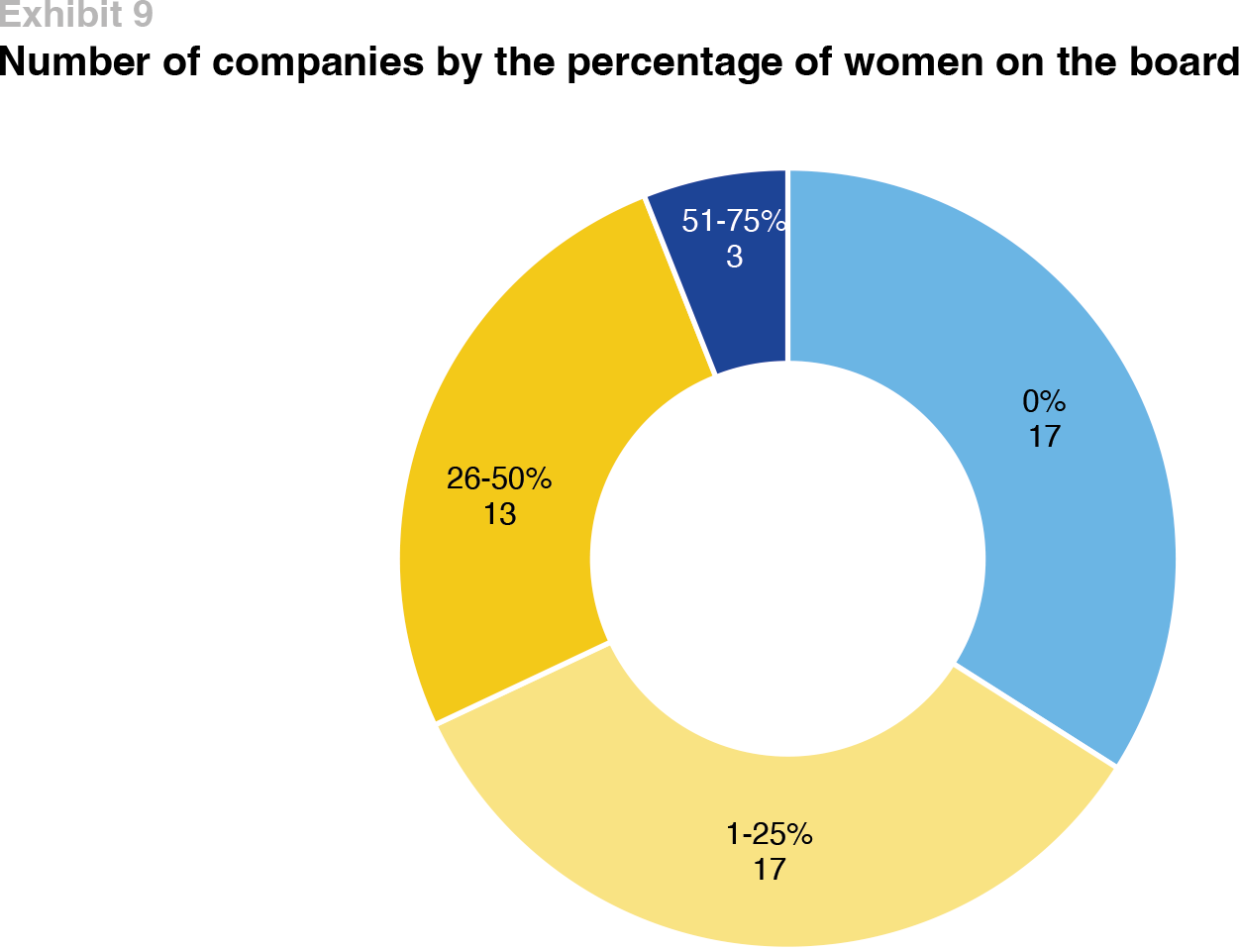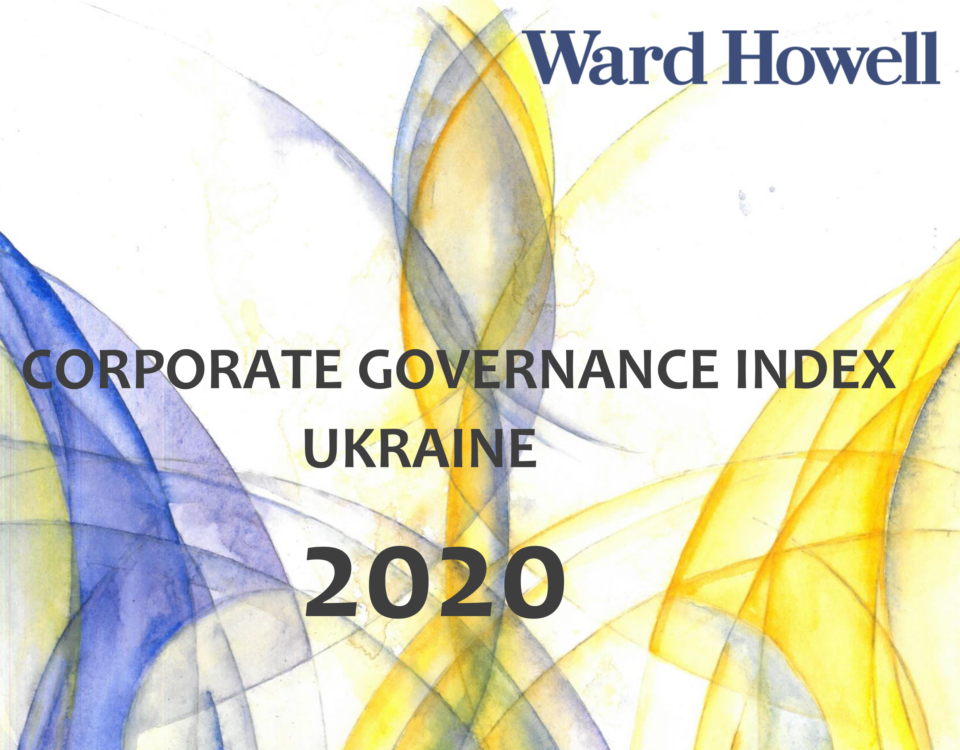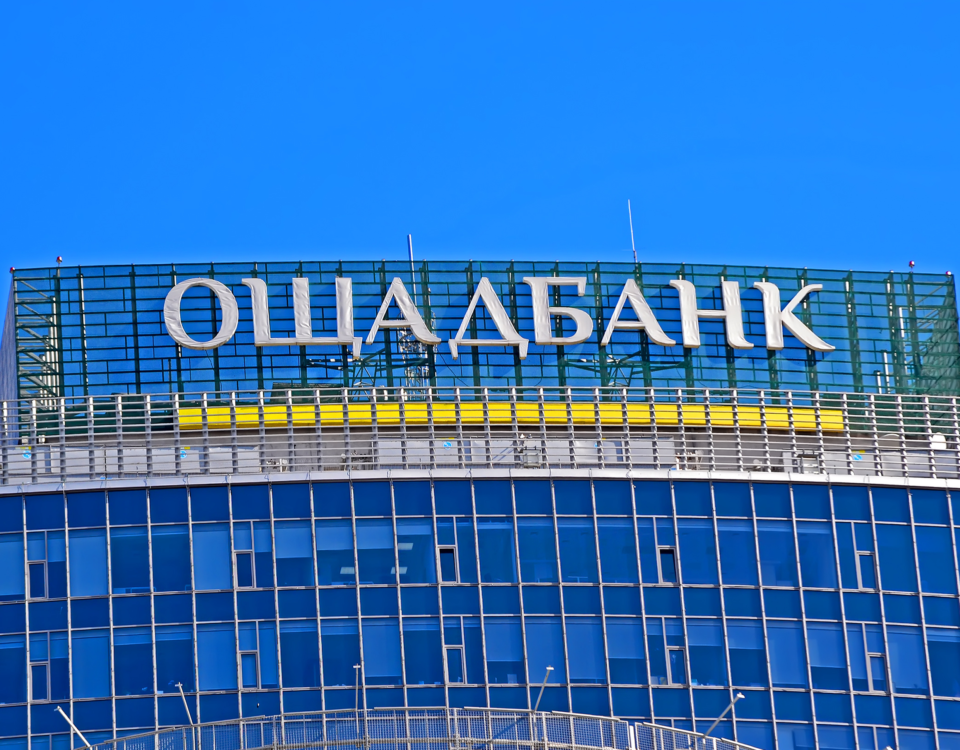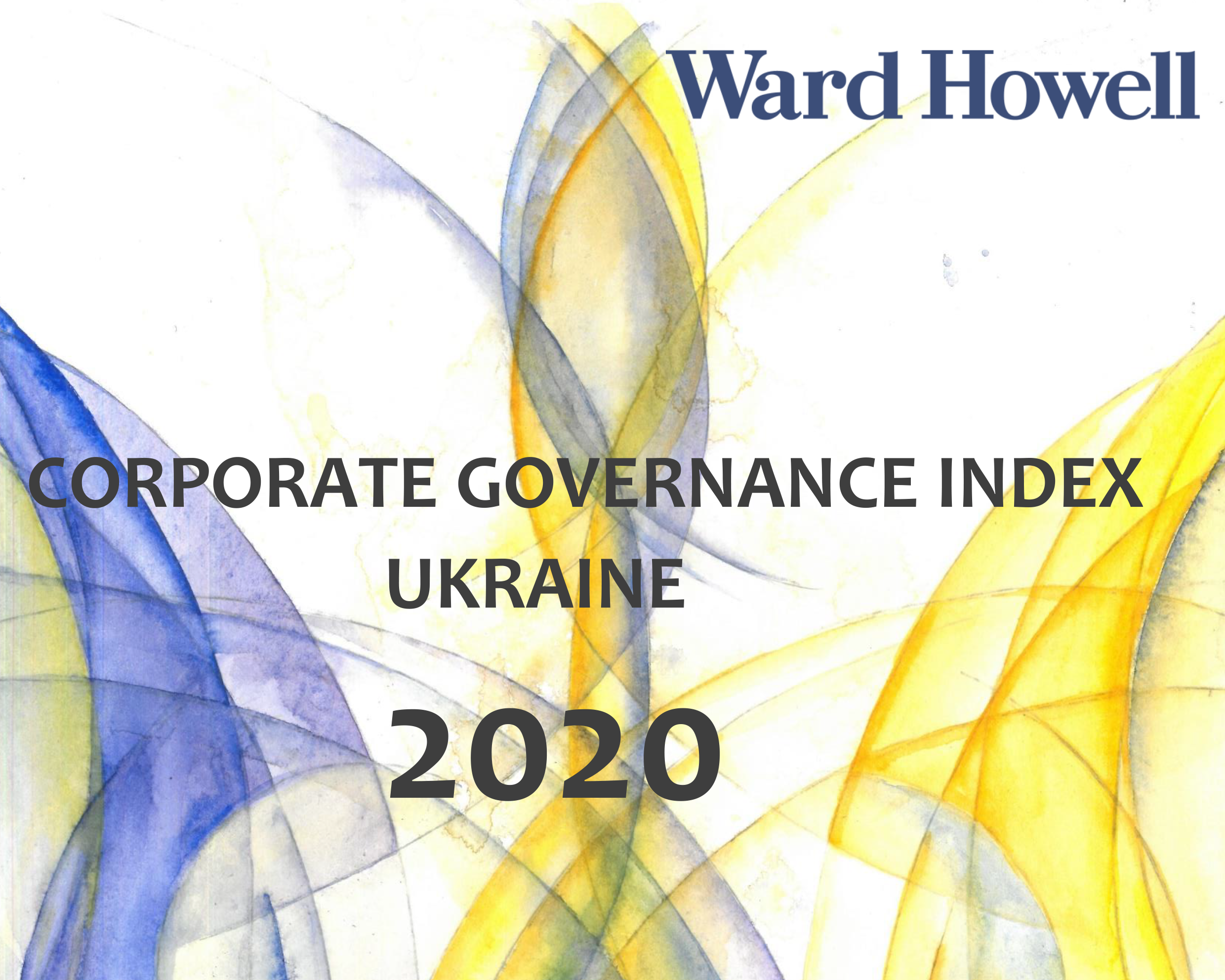
CORPORATE GOVERNANCE INDEX UKRAINE 2020
April 26, 2023
Abu Dhabi
Januar 9, 2025
CORPORATE GOVERNANCE INDEX UKRAINE 2021
INTRODUCTION
Introducing the third edition of the Ward Howell Ukraine Corporate Governance Index, an annual study aimed at evaluating the present state and emerging trends in corporate governance within Ukraine.
Our objective is to offer business leaders a comprehensive overview of current board practices in the country, encompassing aspects such as board size, composition, committees, as well as profiles of Chairpersons and CEOs.
We trust that this research paper will serve as a valuable and practical resource, offering ideas and insights for our readers. We warmly welcome your feedback and eagerly anticipate the opportunity to engage in discussions regarding any matters stemming from our research.
METHODOLOGY
WHU-50
The WHU-50 is an annual list compiled by Ward Howell Ukraine that showcases the top 50 Ukrainian companies leading the way in corporate governance development. In 2021, we analyzed 329 board members across the 50 companies featured in the WHU-50, compared to 335 in 2020 and 323 in 2019.
The list, available on page 22, comprises the following categories of companies with publicly accessible information on their corporate governance systems:
In contrast to well-established stock exchange indices and business magazine rankings, which adhere strictly to predefined rules, the WHU-50 Index components are handpicked by Ward Howell. The company selection process involves assessing each company's merit based on several primary criteria:
The index excludes certain private Ukrainian companies that maintain well-developed advisory boards but lack publicly available information on their boards of directors.
As transparency continues to improve year over year, the list remains dynamic and subject to change.
Data sources and definitions
We collected all publicly available data from the websites and official documents of the 50 companies, including but not limited to:
All data were taken as of December 31, 2021. In the few cases when such information was not found in the documents listed above, the data were taken from the most recent and relevant documents.
Our research focuses mostly on gathering numerical data and constructing statistical models to reveal the patterns of corporate governance in Ukraine.
A company's country allocation in the WHU-50 is determined based on its initial incorporation and market perception. We define international companies as those in which foreign citizens hold the majority of shares, and foreign professionals are considered individuals with a nationality different from Ukrainian. New board members refer to those appointed for the first time in 2021.
By the term “board” we mean either the supervisory board as in a two-tier system or the board of directors as in a one-tier system. The management board is identified as such.
List of abbreviations
FSE - Foreign Stock Exchanges
Max - Largest number among the research subjects
Min - Smallest number among the research subjects
Q1 - Lower quartile – the point at which one fourth of the data are less than or equal to that point.
Q3 - Upper quartile – the point at which one fourth of the data are larger or equal to that point.
SOB - State-Owned Bank
SOE - State-Owned Enterprise
USE - Ukrainian Stock Exchanges
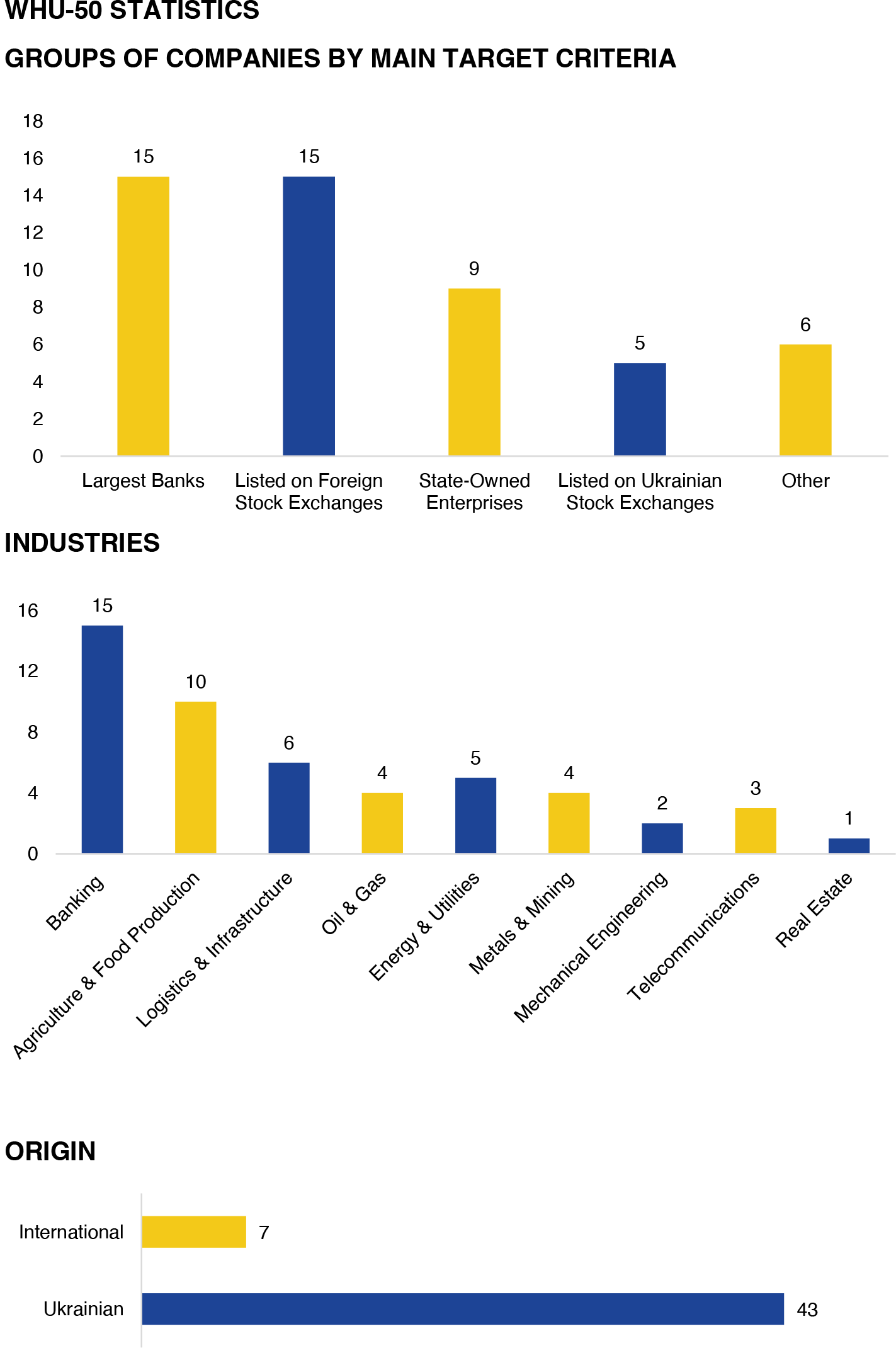
RESULTS
Board Size
The average board size across the WHU-50 in 2021 is 6.6 board members, a slight increase from 6.3 in 2020. This includes both independent directors and shareholder representatives.
Banks have the largest boards while the smallest boards tend to be found in the companies listed on foreign stock exchanges and in the state-owned enterprises. Among 48 companies which were included in both the 2019 and 2020 board indexes, 7 companies increased, and 10 companies decreased the number of board members.
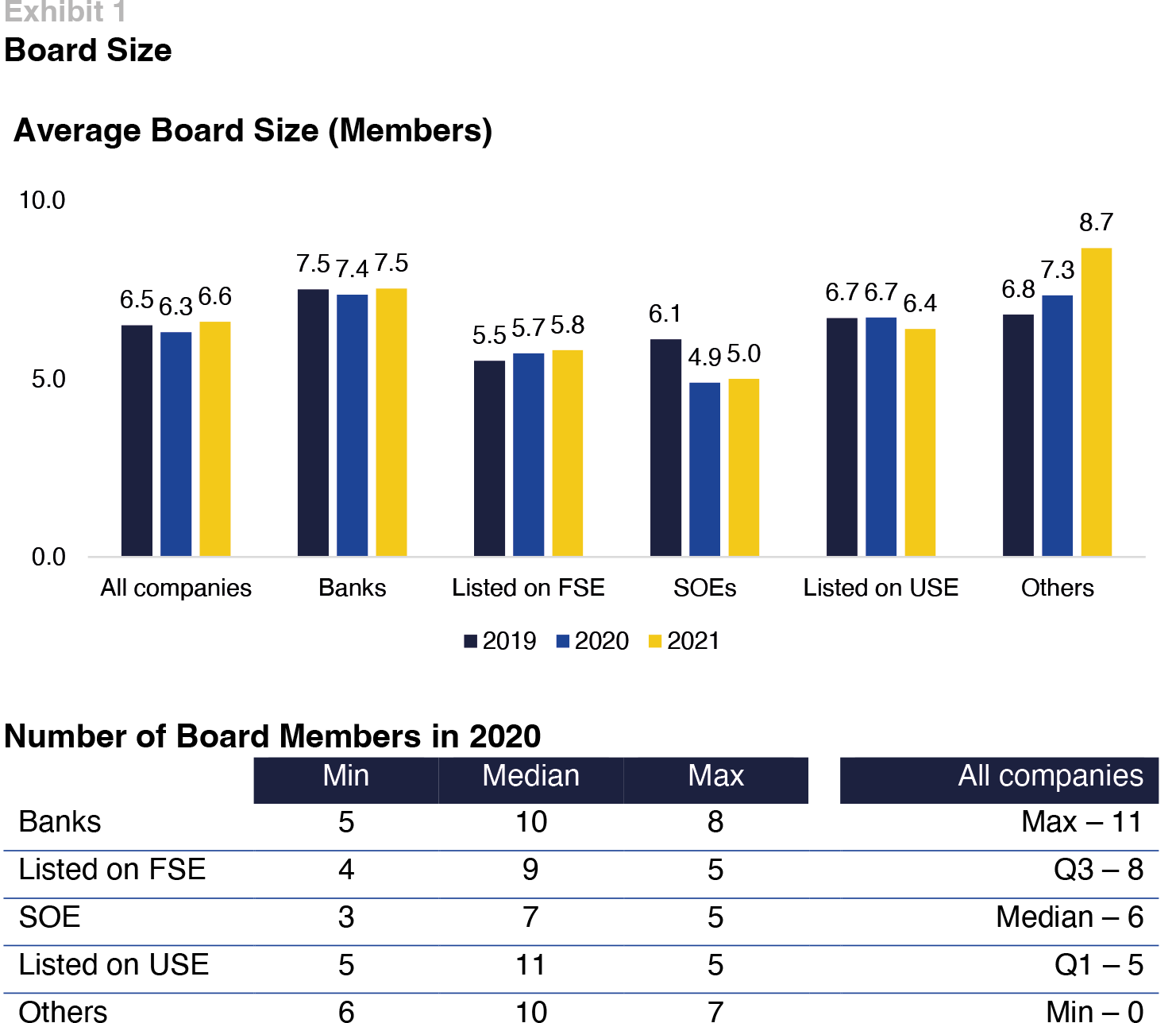
One-Tier vs. Two-Tier Boards
There are two types of board structures: the one-tier board (also called a unitary board) and the two-tier board (also called a dual board). Ukraine has adopted a two-tier board structure: Ukrainian joint stock companies usually have a supervisory board and a management board. However, companies listed on foreign stock exchanges usually have one-tier boards in accordance with local exchange regulations. Among the WHU-50 companies, 34 (68%) have two-tier boards and 16 (32%) have one-tier boards. All banks and state-owned enterprises have two-tier boards while all companies listed on foreign stock exchanges have one-tier boards
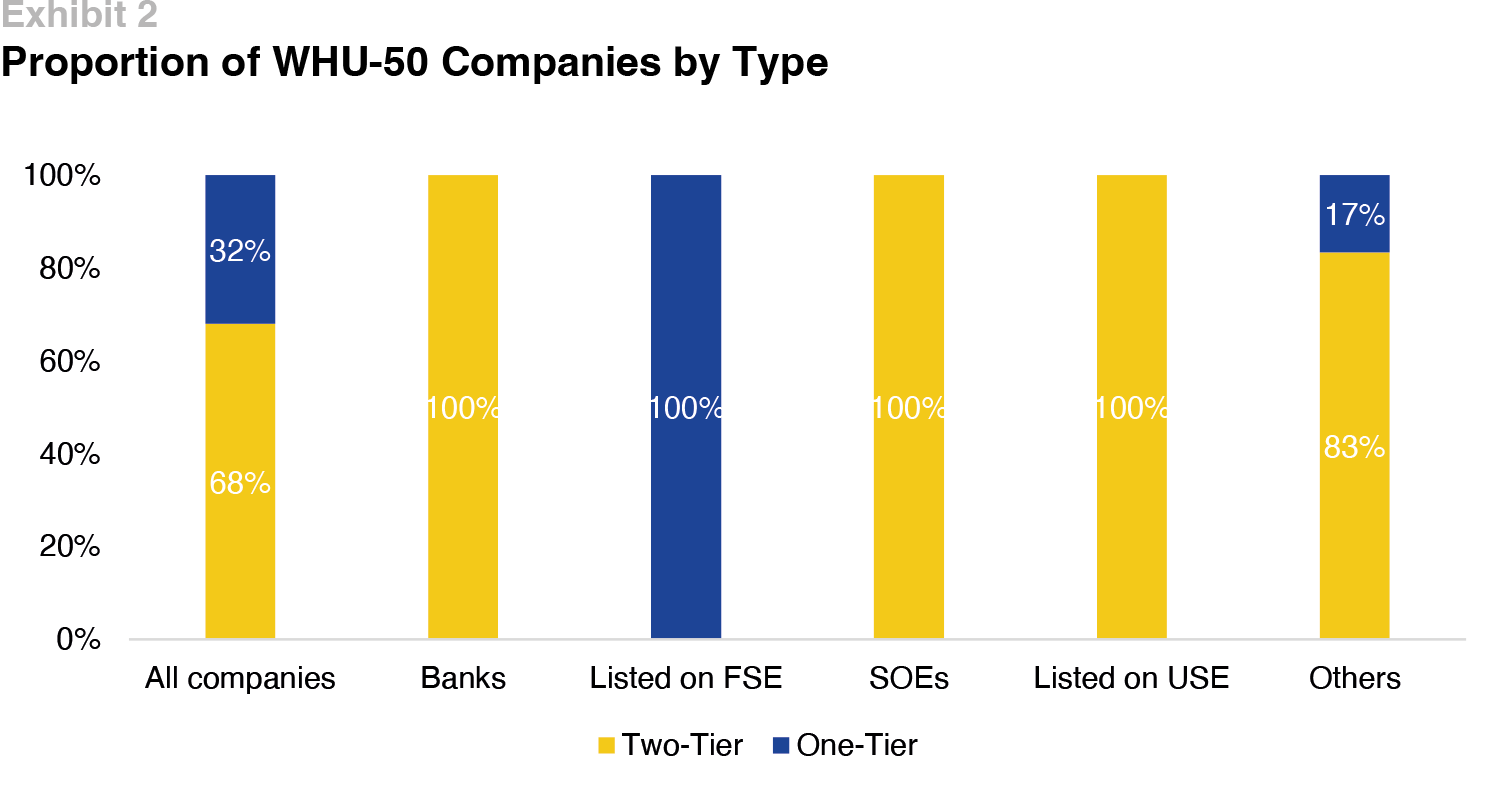
In the one-tier board, the Chairman of the board and the Chief Executive Officer both sit on a single board. In contrast, the two-tier board system separates the supervisory board, led by the Chairman of the board, from the management board, led by the CEO of the company.
The average size of two-tier boards has increased from 6.5 members in 2020 to 6.9 members in 2021. Meanwhile, one-tier boards have remained stable at an average of 5.9 member
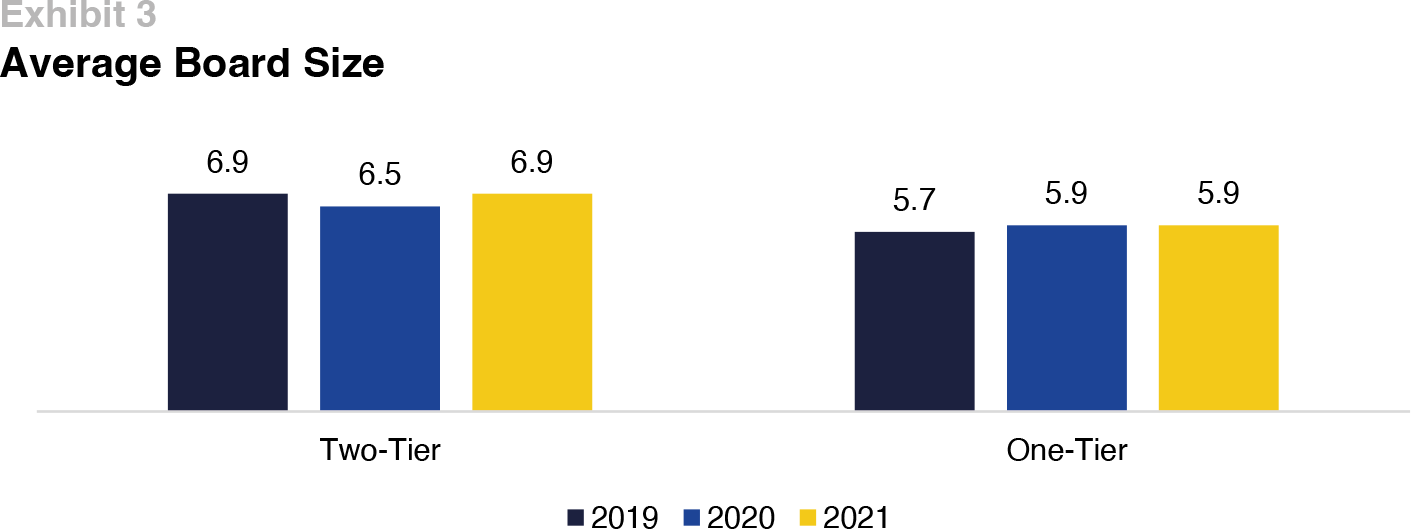
Independent Directors
Out of the 329 board members across the WHU-50 in 2021, 146 members were classified as independent, representing 44% of the total board. The remaining 183 board members were either shareholders or their representatives, making up 56% of the total board. The percentage of independent board members increased slightly from 43% in 2020.
In 2021, the percentage of independent board members increased for companies listed on foreign stock exchanges and the Ukrainian Exchange, while state-owned enterprises (SOEs) experienced a slight decrease in the percentage of independent board members. In other companies, the percentage of independent board members remained unchanged.
As previously, state-owned enterprises had the highest percentage of independent board members at 56%.
Five companies had no independent board members, compared to three in 2020, and 11 companies had less than three independent members on their boards.
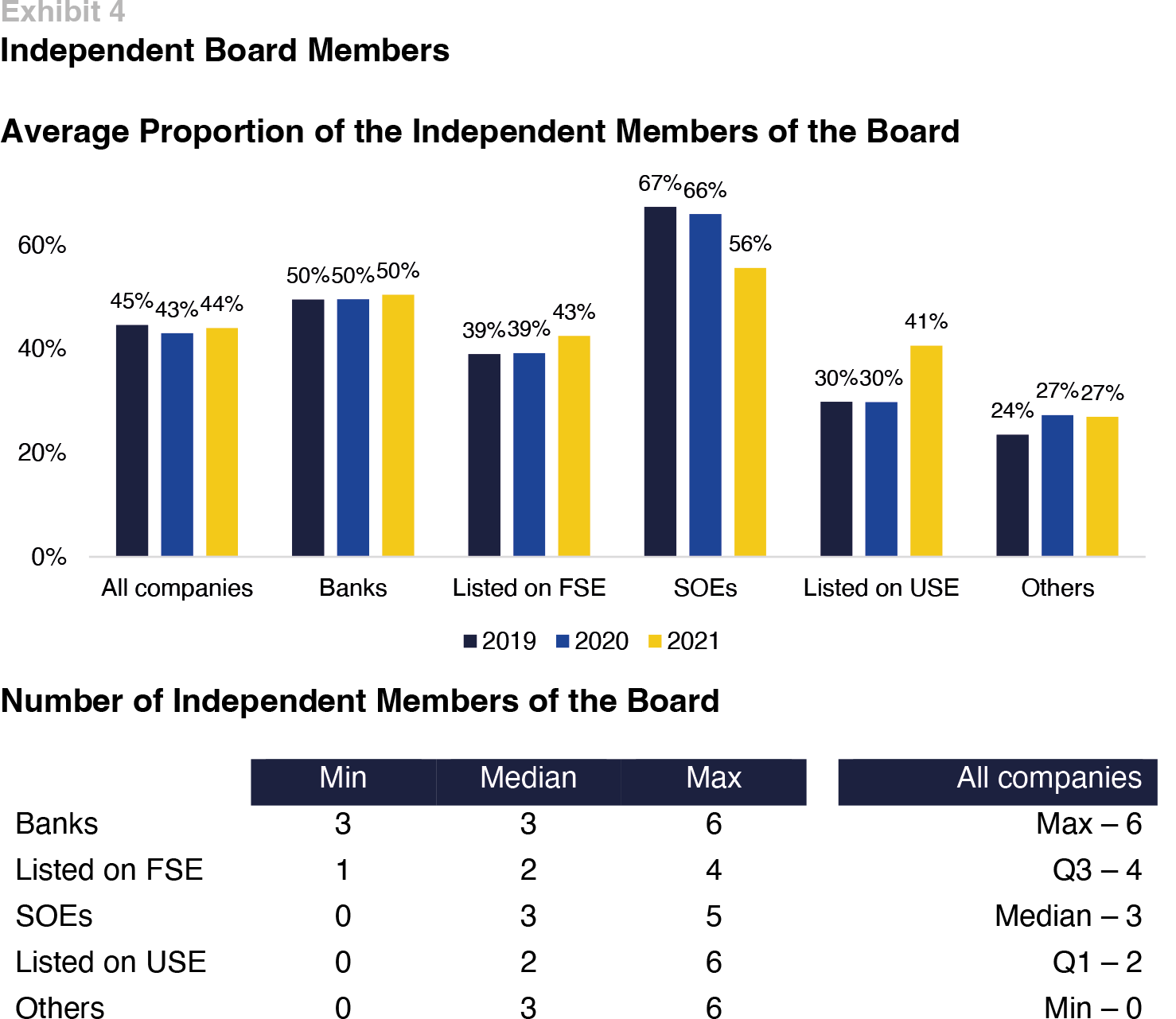
Foreign Professionals on the Board
As of 2021, 157 members, or 48%, of board members on the WHU-50 are foreign professionals. This marks the second consecutive year of an increase in this ratio, up from 44% in 2019.
However, there was a decrease in the proportion of foreign professionals on bank boards in 2021, while an increase was observed among companies listed on foreign stock exchanges. When comparing the group of companies, we found that the proportion of foreign professionals on boards falls within a narrow range of 52-53%, except for companies listed on Ukrainian exchanges, which only have 3% of foreign professionals on their boards.

Generally, the WHU-50 boards comprise of foreign professionals from 33 distinct nationalities, excluding Ukraine. The most common nationalities represented on the WHU-50 boards are the United Kingdom, France, and the United States. This applies to both all board members and specifically to independent board members.
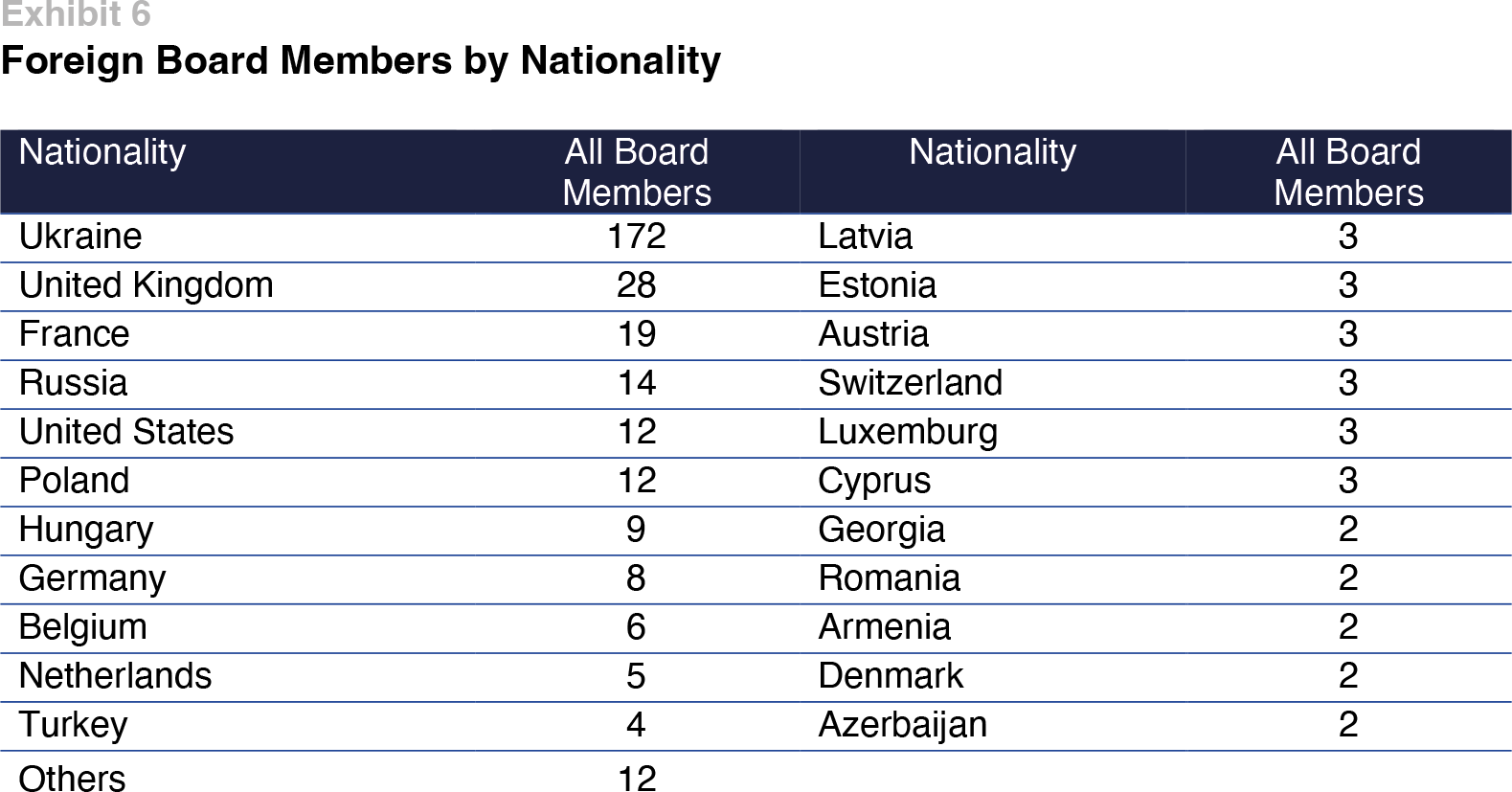
Among the WHU-50 companies, there are four where the number of foreign professionals on the company boards is as high as 8, accounting for 100% of their board members. On the other hand, nine companies from the WHU-50 have no foreign professionals serving on their boards
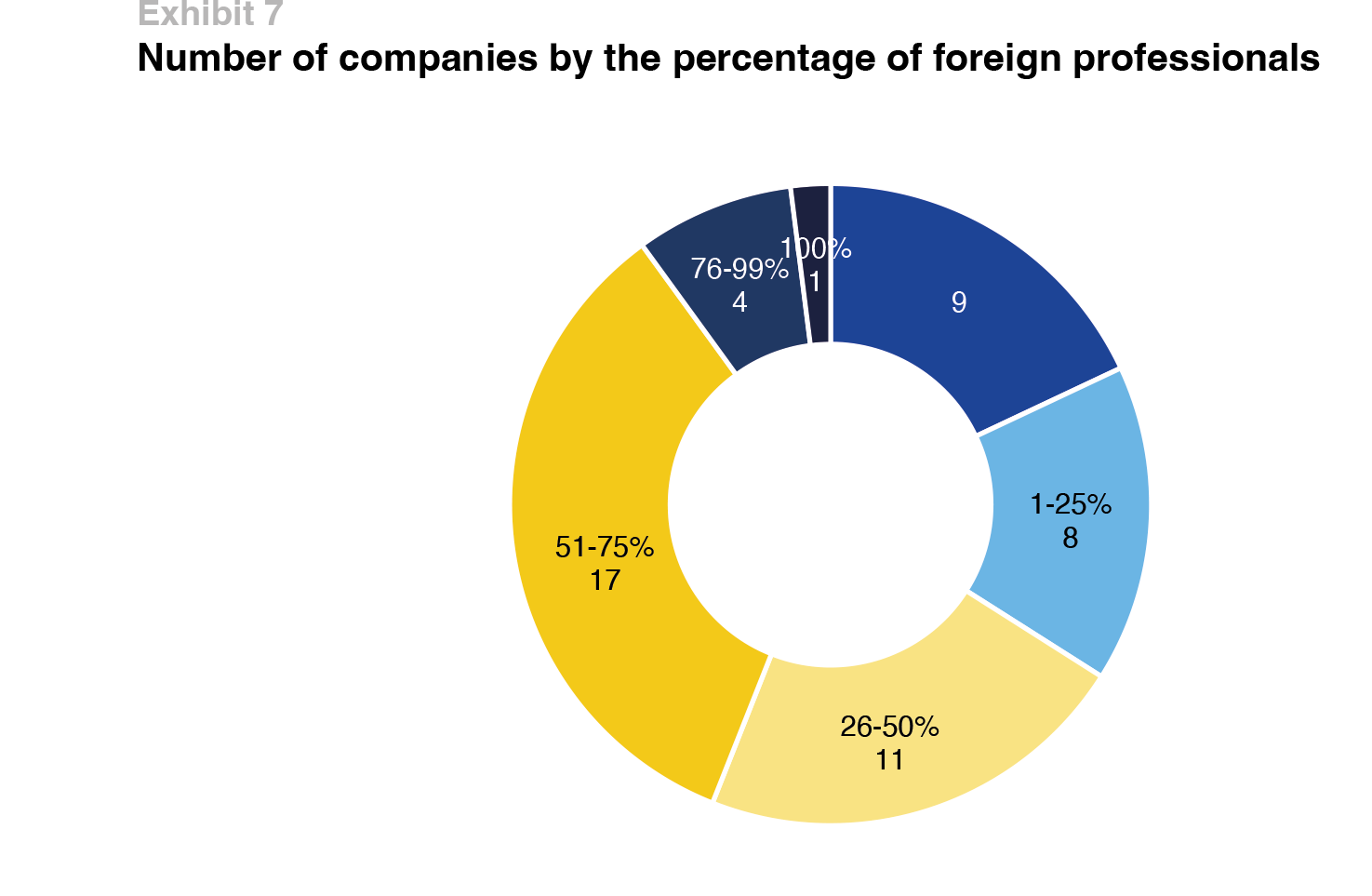
Women on the Board
The issue of diversity, particularly with regard to female representation on corporate boards, remains a significant and timely concern.
According to the data, among the 329 directors comprising the WHU-50, 70, or 21.3%, are women. This marks a second consecutive year of improvement, with the figure increasing from 19.4% in 2020 and 17.6% in 2019.
Banks as well as companies listed on Foreign and Ukrainian stock exchanges, have shown notable progress in terms of gender diversity on their boards. In fact, the Ukrainian stock exchange boasted the highest percentage of female representation in 2020, with as much as 34% of board seats held by women.
Overall, the upward trend in female representation on corporate boards is encouraging, though there remains significant room for improvement. As the global conversation around diversity, equity, and inclusion continues to gain momentum, it is likely that greater attention will be paid to this issue, with the hope of achieving more equitable and diverse boardrooms.
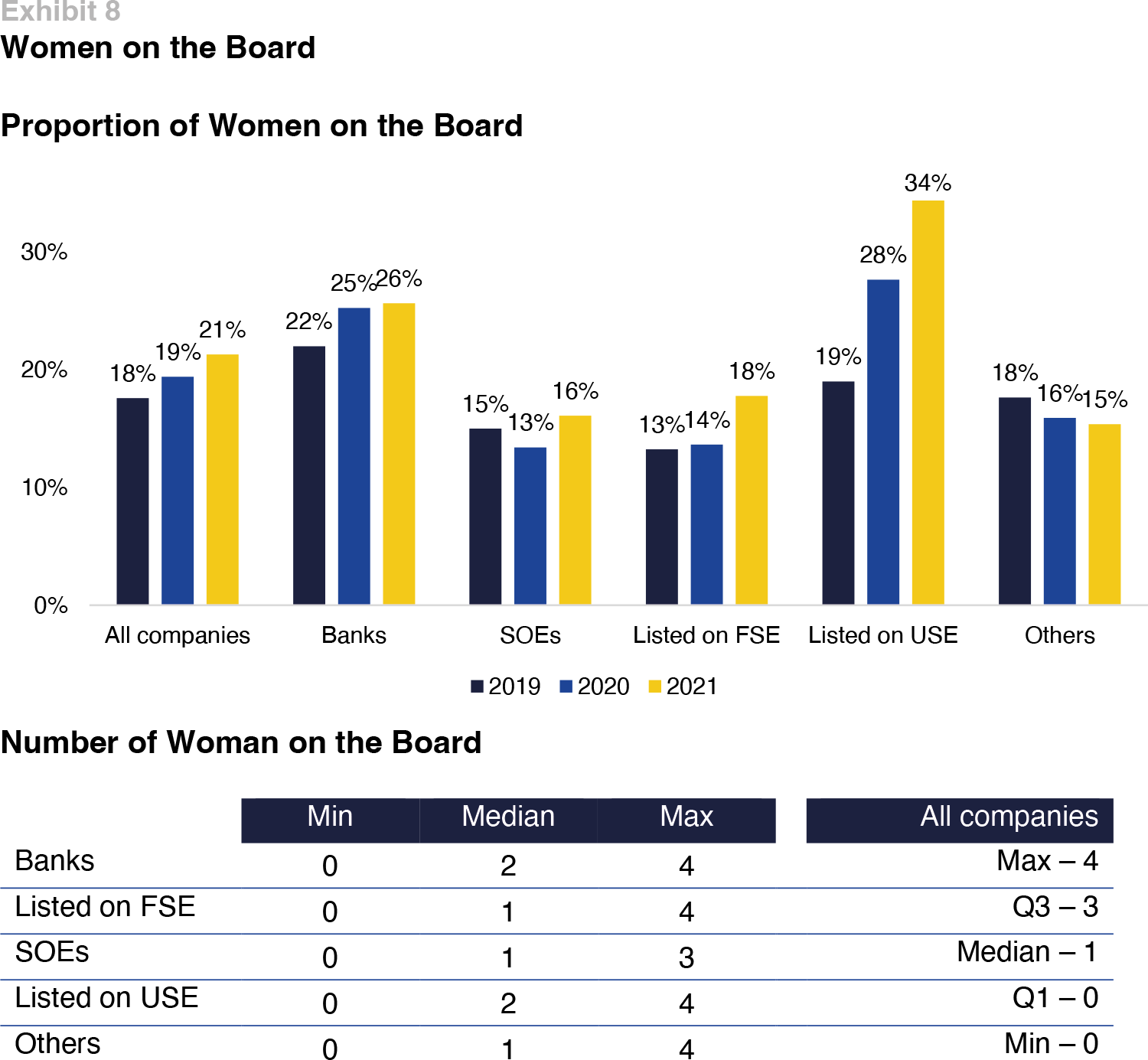
There are three companies among WHU-50 that have a majority of 60% of women on the board. There are two companies with half of the board comprising women. At the same time, there are still 17 companies out of WHU-50 with no female representation on the board.
Regarding the nationality of female board members, it is worth noting that out of the 70 women currently on the board, 49 are Ukrainian. However, there are also 5 female board members who hold British citizenship, and 2 female board members who hold American citizenship.
In terms of recent appointments, the year 2021 saw the addition of eleven new board members, an increase from the seven new female board members appointed in 2020. This suggests a positive trend towards greater gender diversity in the recruitment of board members.
Tenure of WHU-50 Board Members
The boards of the 50 companies comprising the WHU-50 currently have a total of 329 board members. Over the course of 2021, 57 new board members were appointed, indicating a significant turnover.
It is worth noting that the vast majority of directors were appointed in 2019. Additionally, there are 21 directors who have served on their boards for more than 10 years, with the longest-serving director having held their position for 27 years.
Interestingly, the smallest number of new directors were appointed between 2010 and 2020 in the year 2015, when only 5 individuals were appointed.
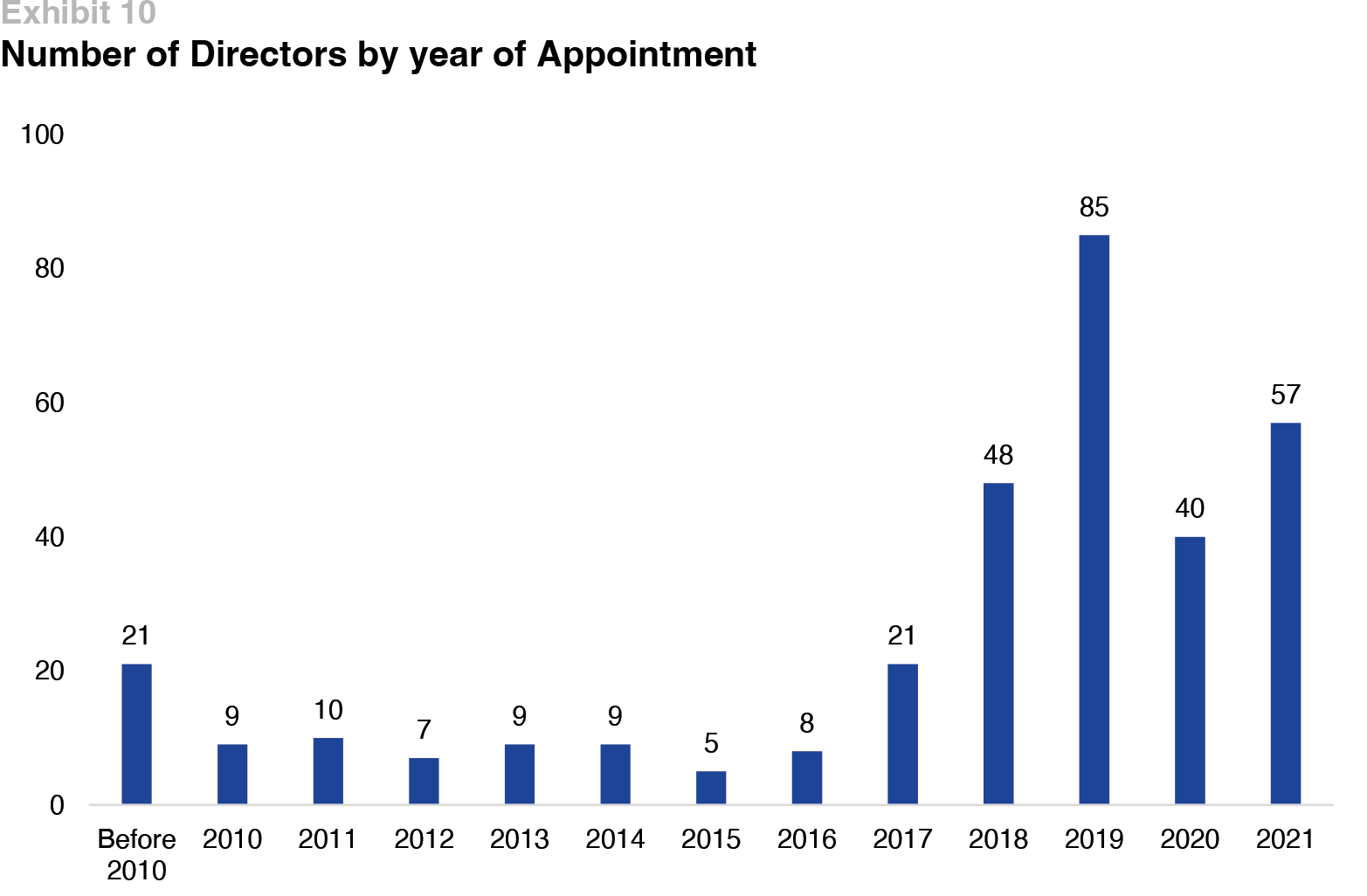
The average tenure of board members is 3.7 years. The average tenure of independent board members is 2.8 years while the average tenure of shareholder representatives is 4.4 years.

Age of WHU-50 Board Members
The age range of board members varies greatly, with the youngest member being 30 years old and the oldest member being 84 years old. On average, the board member's age is 52.5 years old.
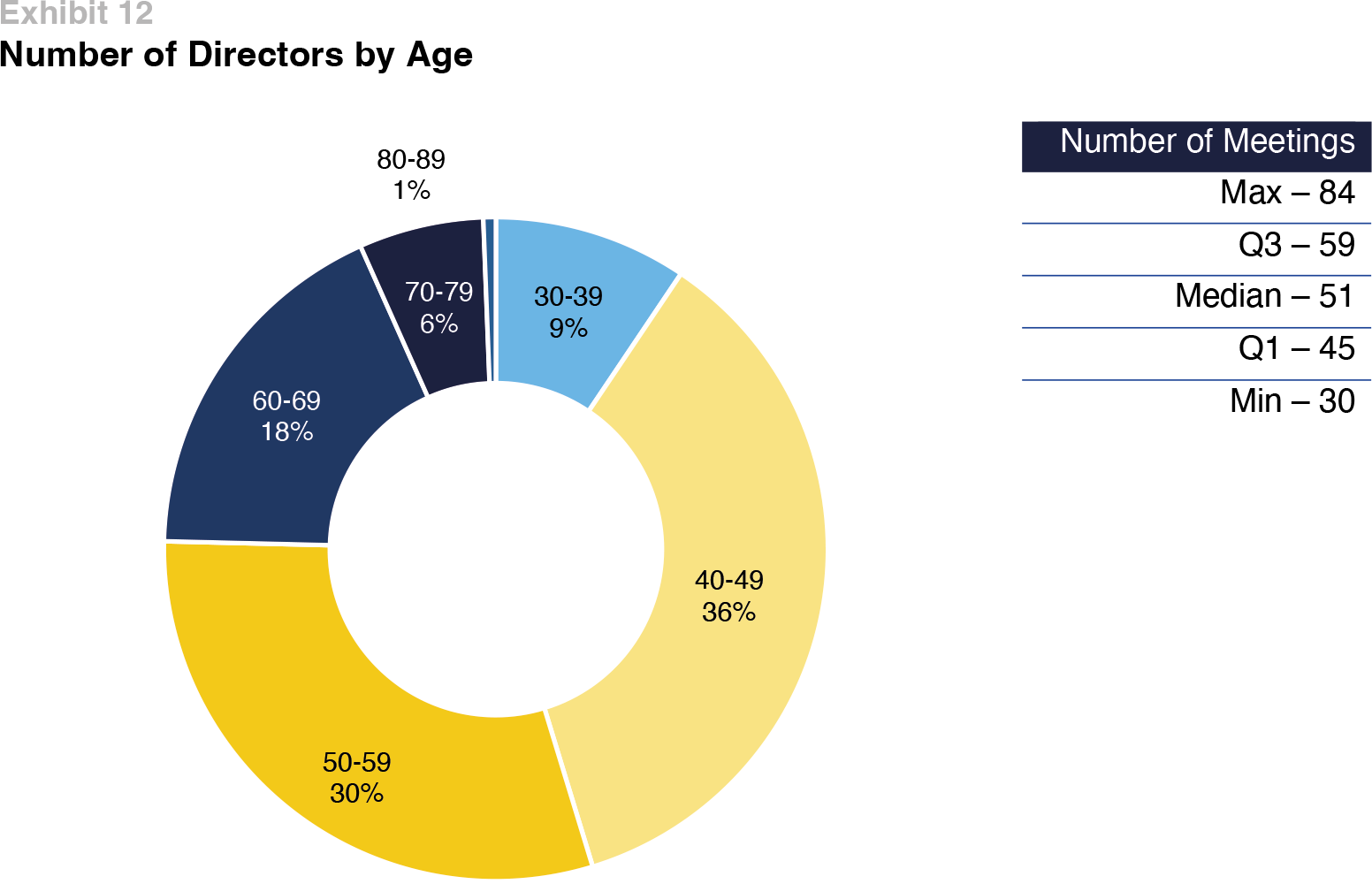
The age distribution of board members is diverse, with a majority falling between the ages of 40 and 49. However, there are also 31 board members aged between 30 and 39. Additionally, there are 22 board members who are between 70 and 84 years old.
Chairman
After analyzing the data of 48 Chairmen from WHU-50 companies ((excluding two companies without a chairman), it was found that 31% of them were independent board members while 69% were either a hired representative of the shareholder or a founder of the company.
The study revealed that independent chairmen of the board were more prevalent in state-owned banks and state-owned enterprises. On the other hand, companies listed on the Ukrainian stock exchanges preferred to nominate non-independent Chairmen, who were often shareholder representatives.
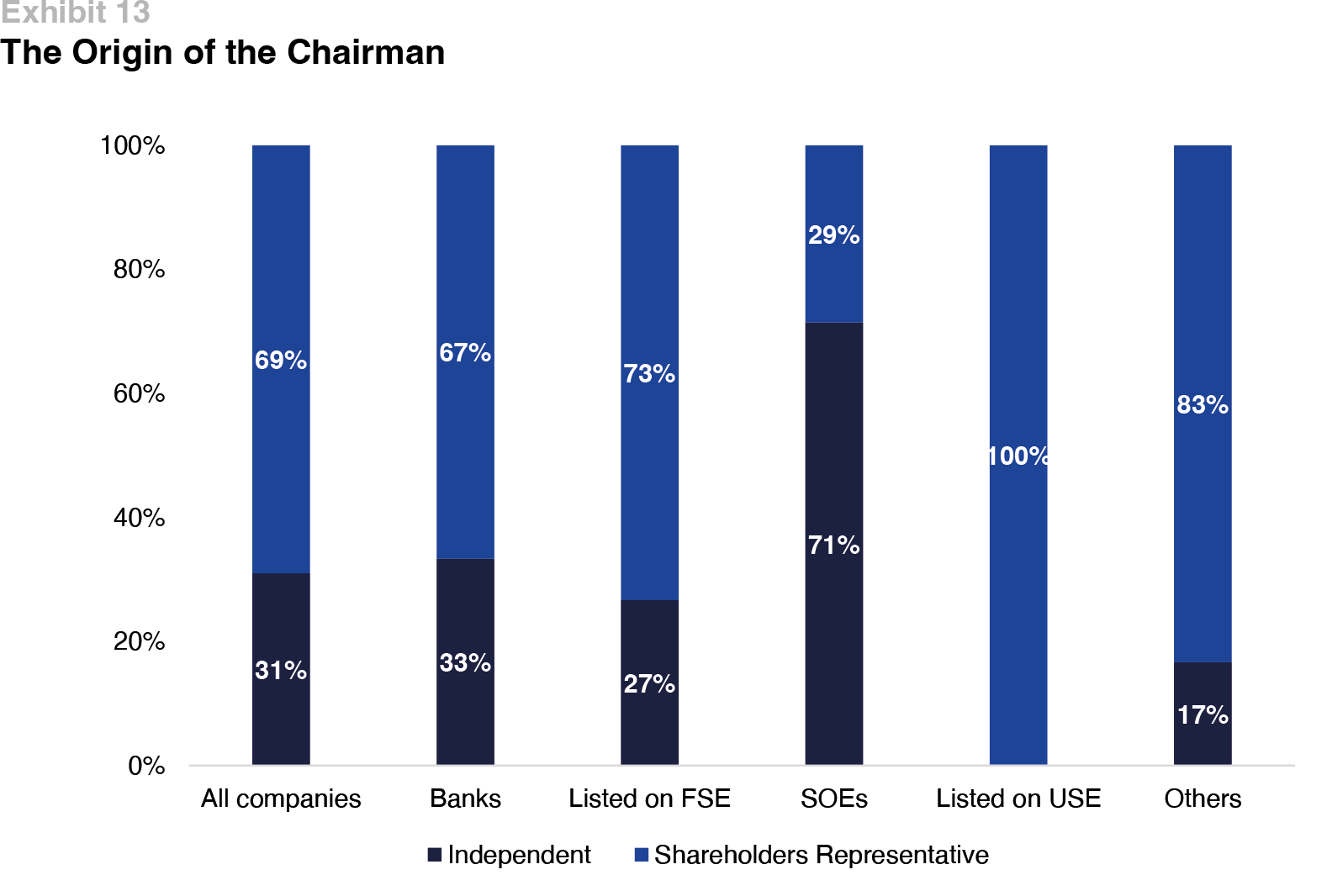
There are two chairmen of the board who are seated on more than one WHU-50 board simultaneously.
Six new chairmen were appointed in 2021. There are six chairwomen of the board at WHU-companies.

New Members on the Board
In 2021, 57 new board members were appointed to the boards of WHU-50 companies, or 17.3% of total board members. For comparison, in 2020 47 new board members were appointed and in 2019, 104 new board members were hired.
Among the 57 newly appointed board members, 11 are women and 45 are men. The 31 of new board members have Ukrainian citizenship while 26 have foreign citizenship, including but not limited to the United Kingdom, France, Poland, etc. The 26 out of 57 newly appointed board members are independent.
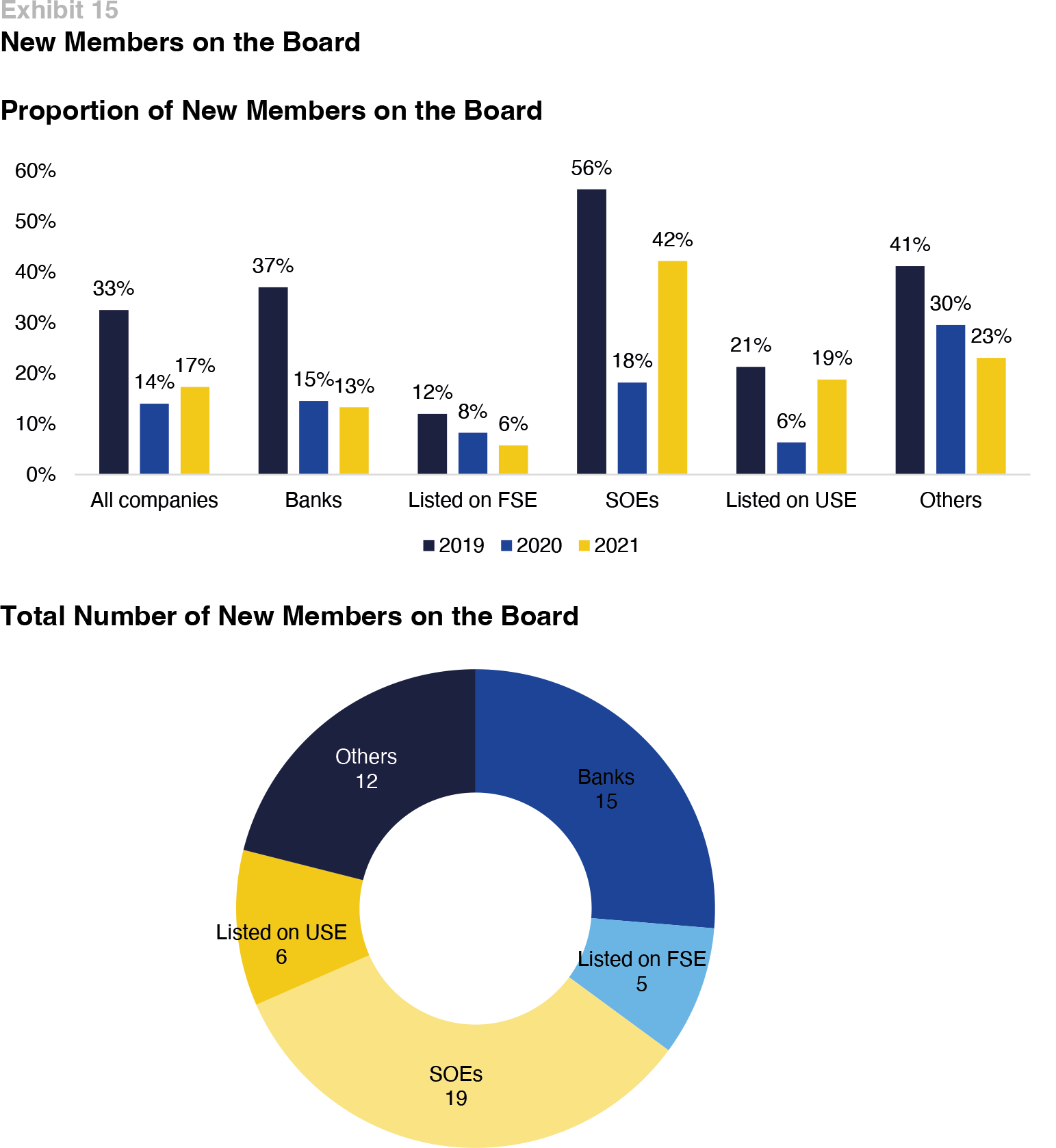
Board Committees
Among the 50 companies of WHU-50, five have not set up any committee. Audit and nomination & remuneration committees are still the most common.
All WHU-50 companies have in total 134 committees with the average of 2.7 committees per board (2.7 in 2020 and 2.6 in 2019). The largest number of committees is 6. State-owned enterprises as well as banks have the largest number of board committees.
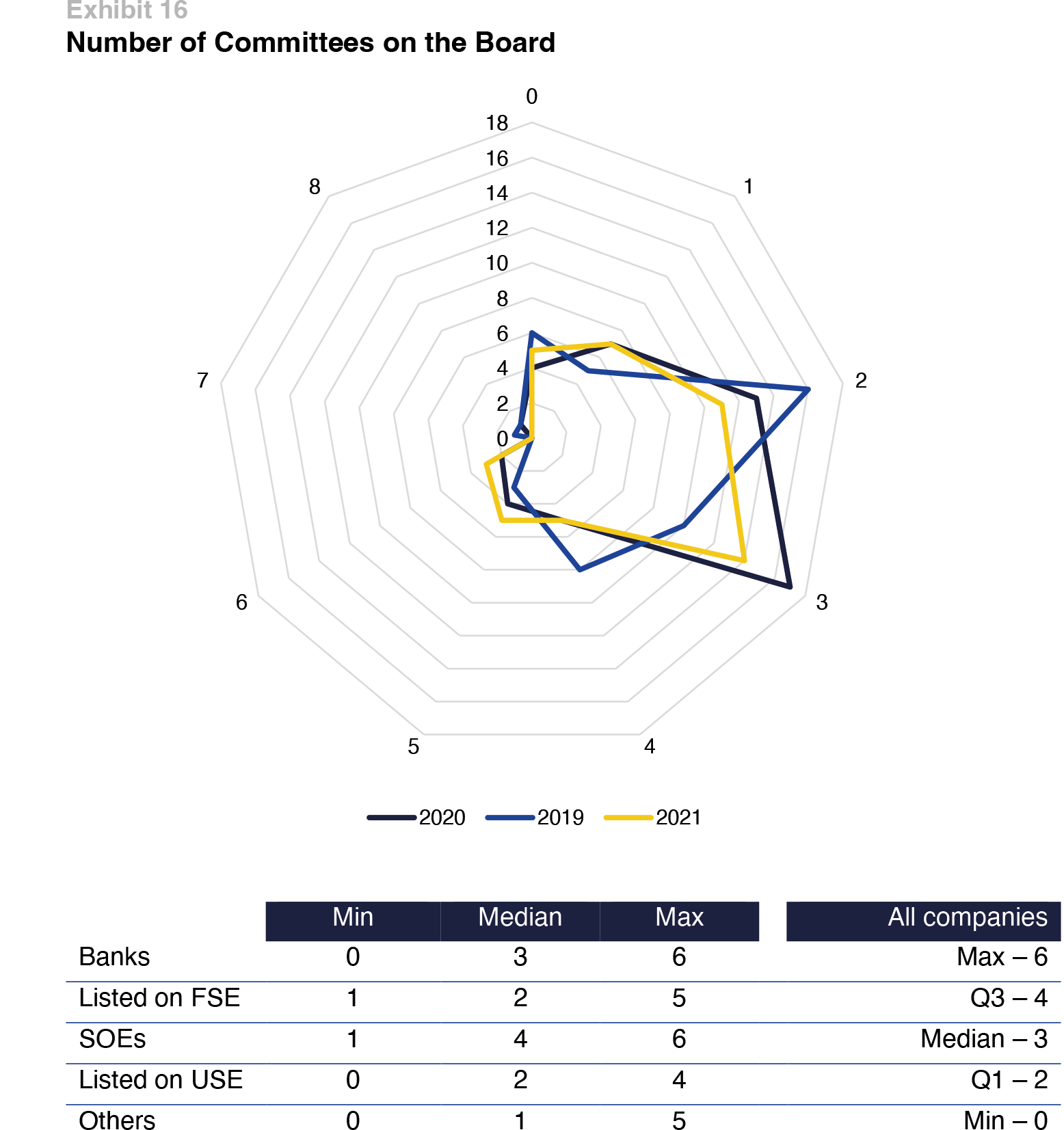
Board Meetings
Based on the available information, the greatest number of meetings held in 2021 per company was 133 compared to 113 in 2020 (the same company) and 126 in 2019 (different company). The smallest number of meetings was 4. The average number of meetings was 31 compared to 32 in 2020 and 25 in 2019 and the median was 16 compared to 18 in 2020 and 17 in 2019. The third quartile equals 45 while the first 7.
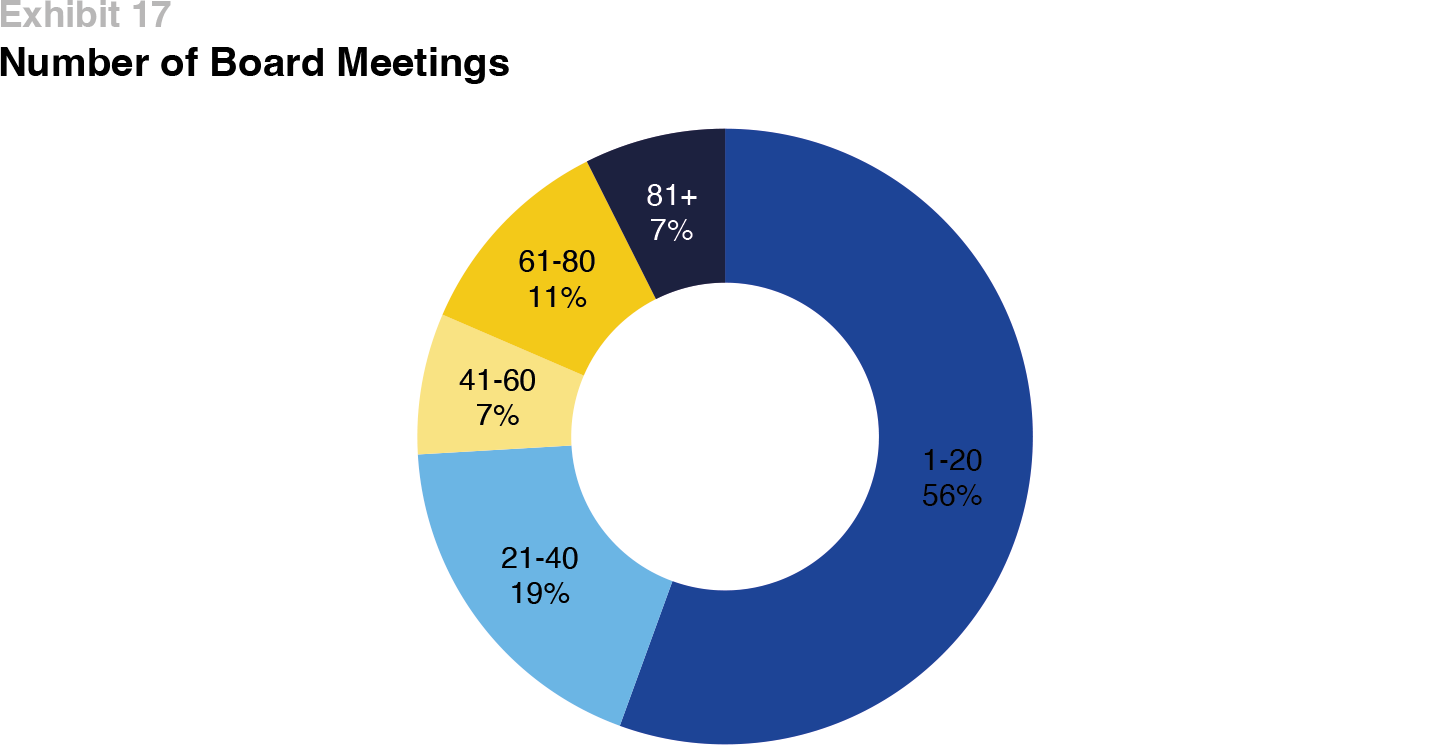
The majority of the companies (42%) have increased the number of board meetings in 2021 as compared to 2020. 31% of companies decreased the number of board meetings
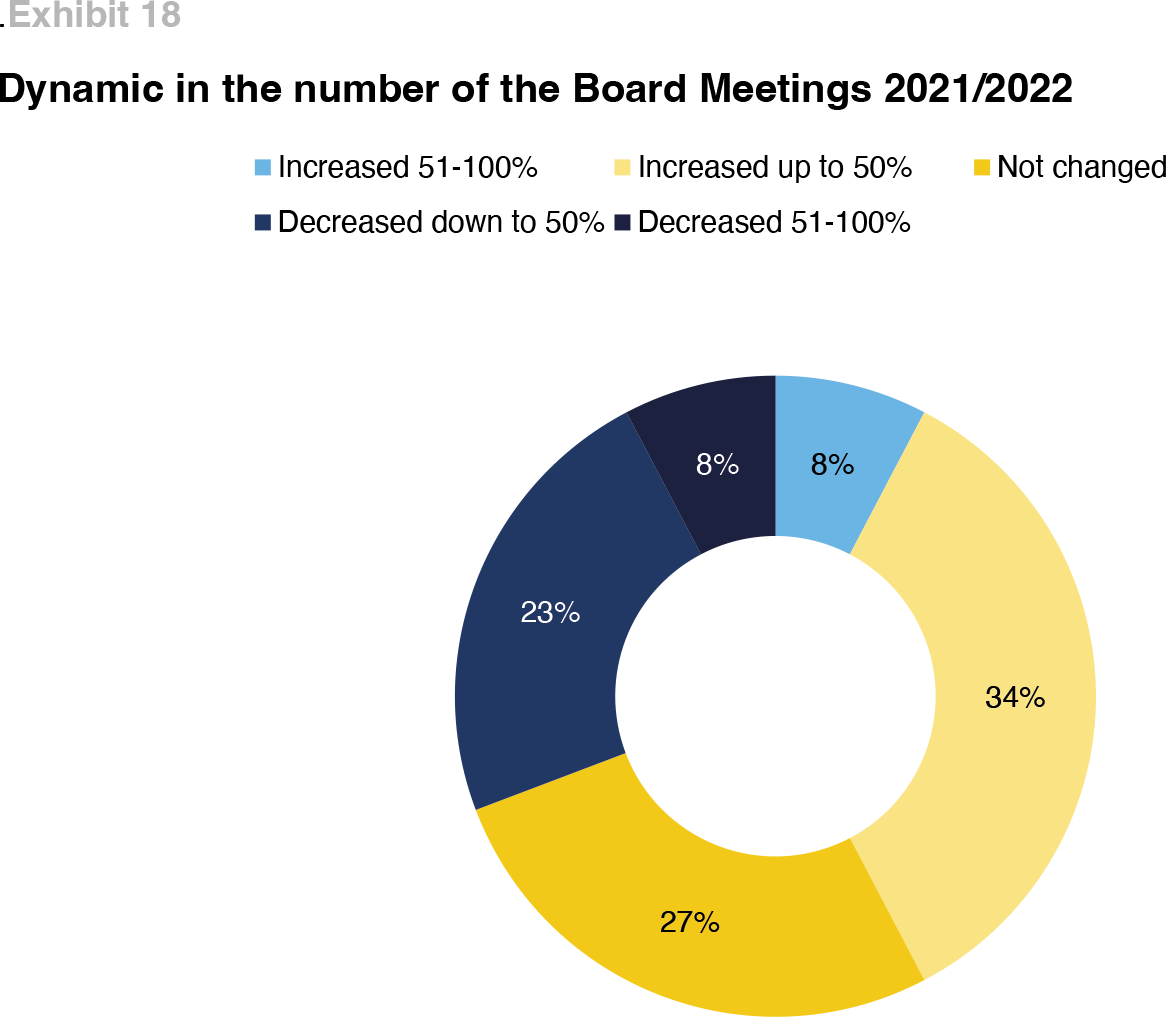
Chief Executive Officer
In 2021, the WHU-50 saw a total of 8 new CEO appointments, compared to 15 in 2020 and 9 in 2019. Among the 8 new CEOs appointed in 2021, only one was female, while the remaining 8 were male. Out of these 8 appointments, 4 were made from within the company's internal hierarchy, while the other 4 were recruited externally from the market. It is worth noting that 75% of the newly appointed CEOs in 2021 were Ukrainian professionals, while the remaining 25% were foreign executives.
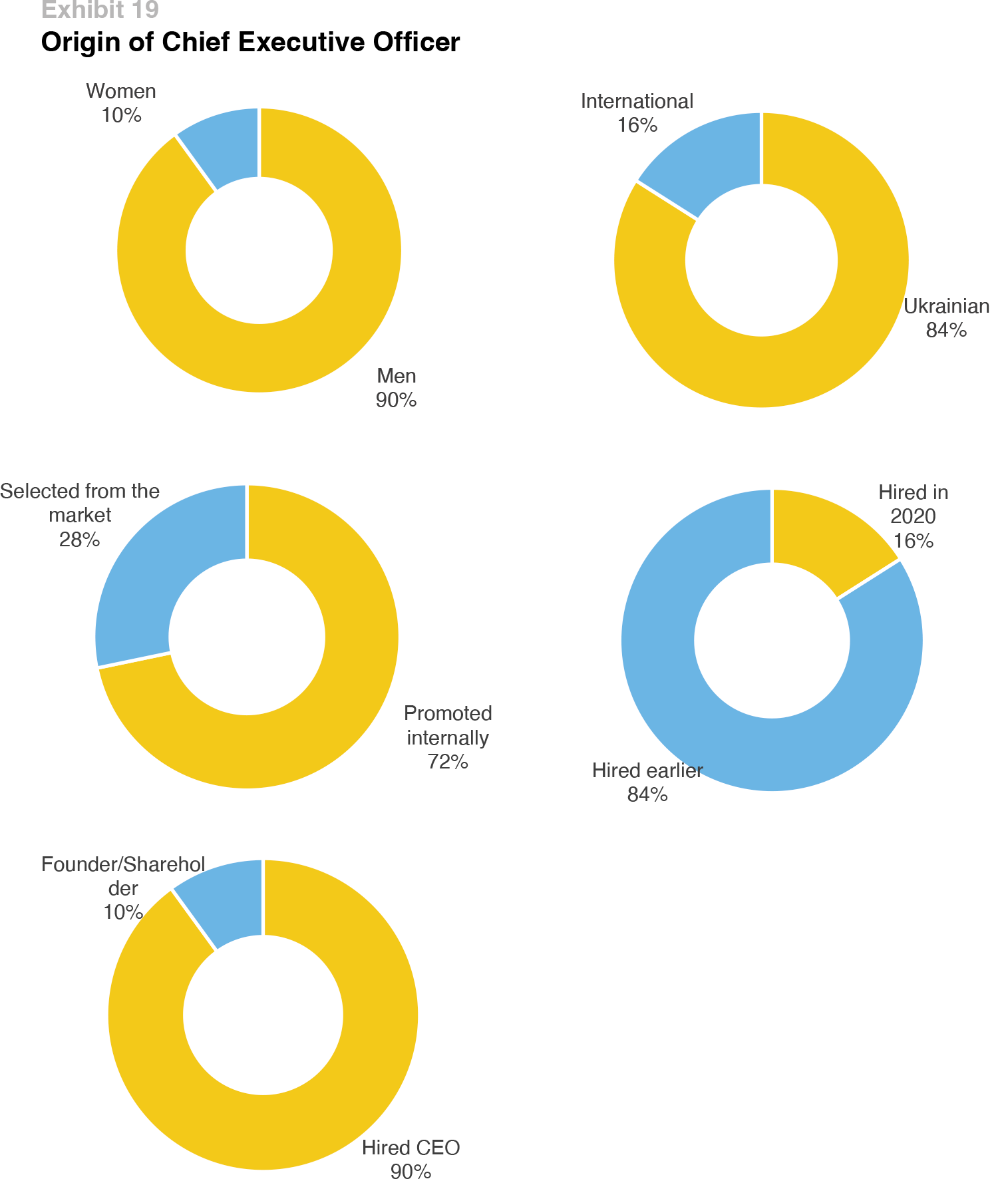
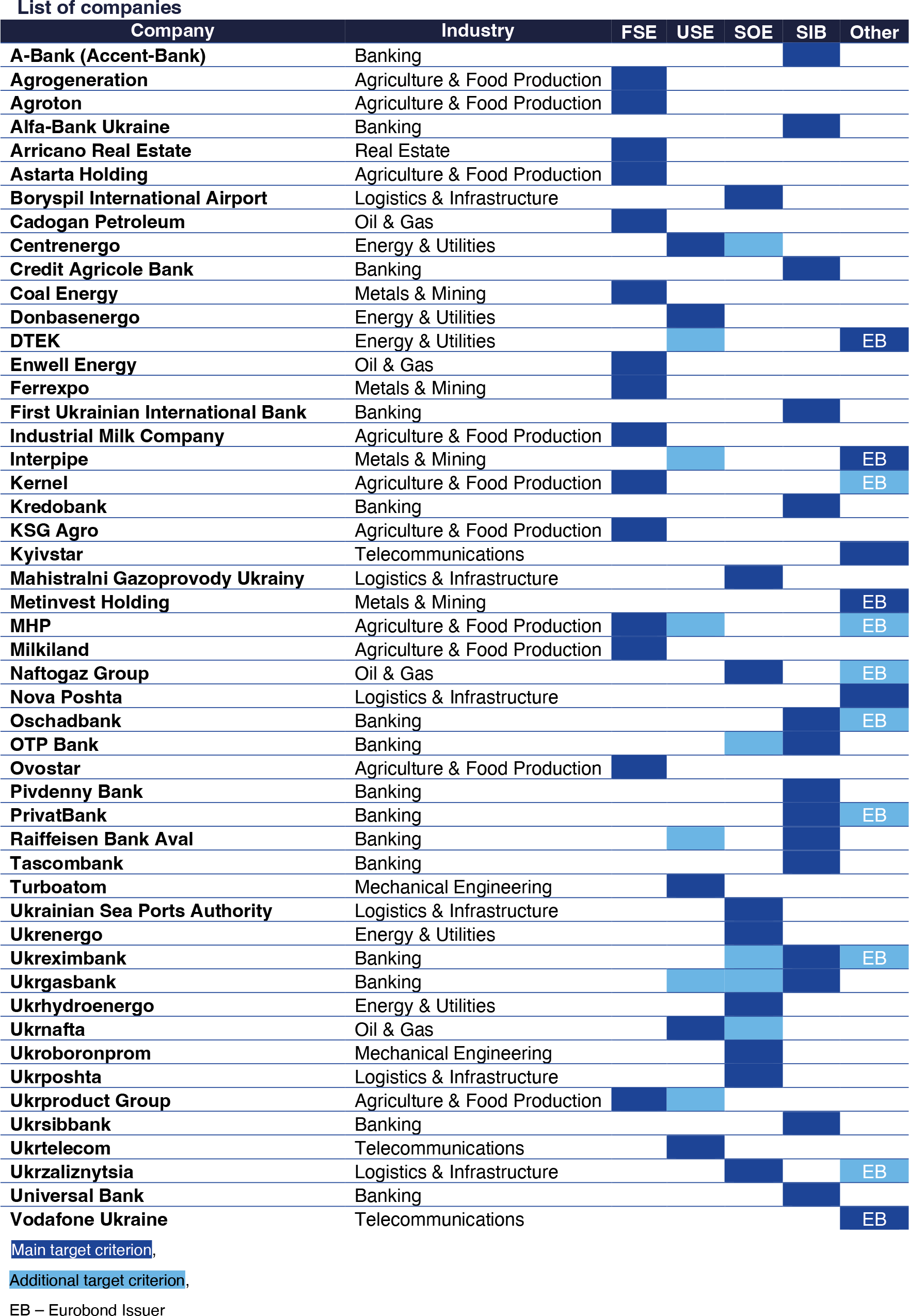
Ward Howell
Ward Howell is one of the major global Executive Search and Leadership Development firms. We were founded in 1951 in New York City by the former head of McKinsey’s executive search practice, Henry Wardwell Howell, a pioneering management consultant who helped create the Executive Search profession. Today Ward Howell operates a network of 30 offices worldwide, is supported by over 130 partners, and is active in all major industry and services sectors.
Ward Howell Ukraine
Ward Howell opened its office in Kyiv in 2004 in order to support the rapidly growing demand for executive search services in Ukraine. Over the years we have built up an extensive network of personal contacts, especially among key executives and directors. We have also built within our firm an original research capability that rapidly and accurately identifies potential candidates at target companies specified jointly with our executive search clients. We serve a wide range of organizations in virtually every industry in Ukraine and the region. Our experience goes well beyond executive search to leadership development and board services. We help clients improve the effectiveness of their businesses through development and implementation of corporate governance systems, board effectiveness evaluation, and the acquisition, assessment, and development of board members.
Ward Howell Ukraine Leadership Institute
The Ward Howell Ukraine Leadership Institute is a proactive initiative to develop a knowledge-based approach towards research in Ukraine. The Institute was founded in 2019 to promote extensive research on corporate governance and leadership development. The Ward Howell Ukraine Leadership Institute conducts regular research on fundamental themes and developments as well as special research on newly developing topics of the day. The Institute also supports a data-driven approach to the conduct of executive search and consulting projects by Ward Howell Ukraine.

